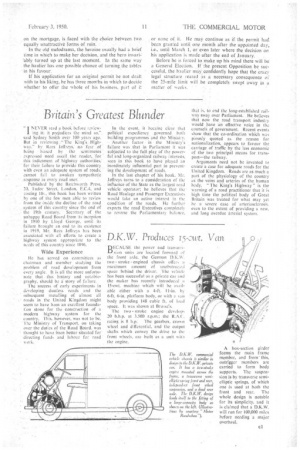Britain's Greatest Blunder
Page 39

If you've noticed an error in this article please click here to report it so we can fix it.
" I NEVER read a book before r2viewing it: it prejudices the mind so." said Sydney Smith over 100 years ago. But in reviewing •" The King's .Highway." by Rees Jeffreys. no fear of being • 1-Diased by the -sentiments . expressed need assail the reader, for this indictment of highWay authorities,' for their failure to provide this country with even an adequate system of roads. cannot fail to awaken sympathetic
• .response in every road user. • Published by the Batchworth Press.
• 20, Fudor Street, London, E.C.4, and costing 18s.. this book has been written • by one of the few men able to review from the inside the decline of the road • system of this country since the end of the 19th century. Secretary of the unhappy Road Board from its inception in 1910 by Lloyd George. until its failure brought an end to its existence in 1919, Mr. Rees Jeffreys has been associated with all efforts to create a highway system appropriate to theneeds of this country since 1896.
Wide Experience
He has served on committees as chairman and member studying the problem of road development from every angle. It is all the more unfortunate that this history and autobiography, should be a story of failure.
The success of early experiments in developing dustless roads and the subsequent metalling of almost all , roads in the United Kingdom might seem to have been an excellent foundat:on stone for the construction of a • modern highway system for the • country. This. however, was not to he. 1 he Ministry of Transport, on taking over the duties of the Road Board. was
• thought to have beenbetter situated for funds and labour for road work.
In the event, it became clear that political expediency governed both building programmes and the Ministry.
Another factor in the Ministry's failure was that in Parliament it was subjected to the fu.II.play Of the powerful and long-organized railway interests, seen in this book. to have played an inordinately influential part in preventing the development of roads.
In the last chapter of his book, Mr. Jeffreys turns to a consideration of the influence of the State as the largest road vehicle operator; he believes that the Road Haulage and Passenger Executives would take an active interest in the condition of the roads. He further expects the road Executives completely to reverse the Parliamentary balance,
that is, to end the long-established railway sway over Parliament. He believes that now the road transport industry would have an effective voice in the counsels of government. Recent events show that the co-ordination which was piously quoted as the reason for nationalization, appears to favour the carriage of traffic by the less economic of -the two principal means for. transport—the railway.
Arguments need not be invented to create a case for adequate roads for the United Kingdom. -Roads are as much a part of the physiology of the country as the veins and arteries of the human body. "The King's Highway" is the warning of a road practitioner that it is high time the political body of Great Britain was treated for what may yet be a severe case of arteriosclerosis, even to the extent of providing a new. and long overdue arterial system.




























































































